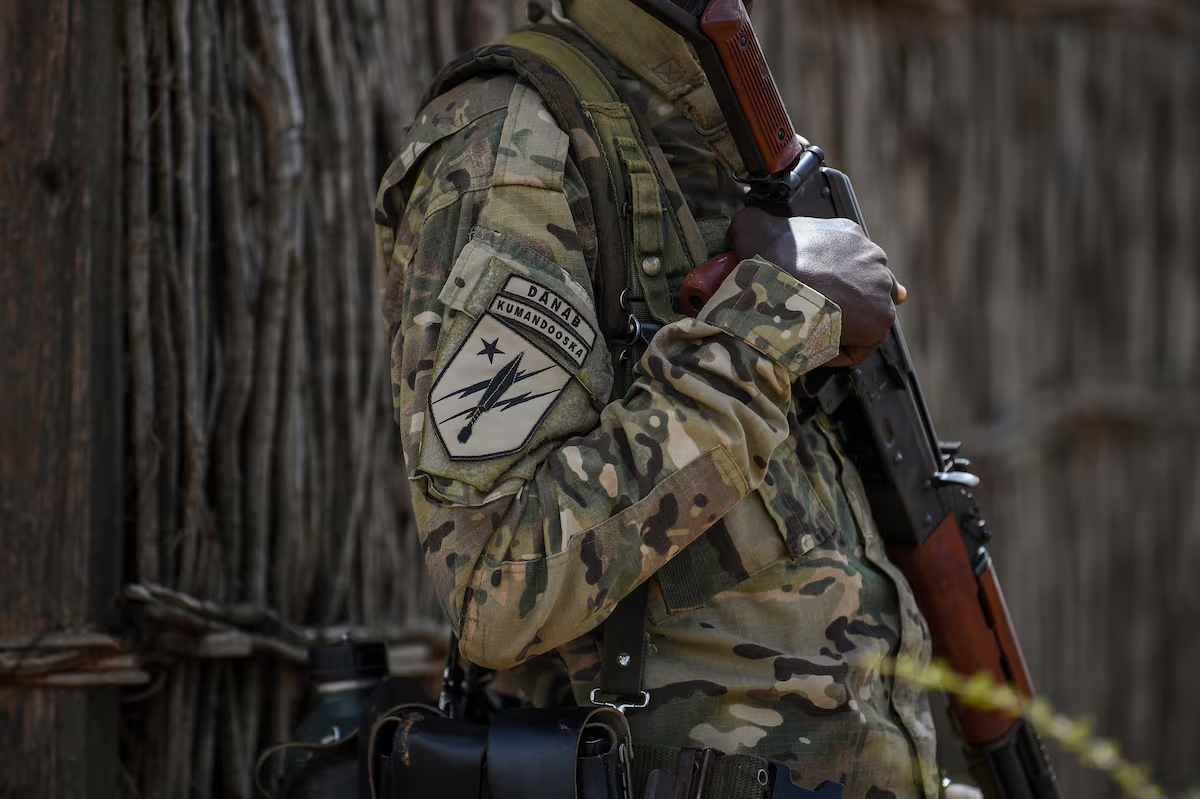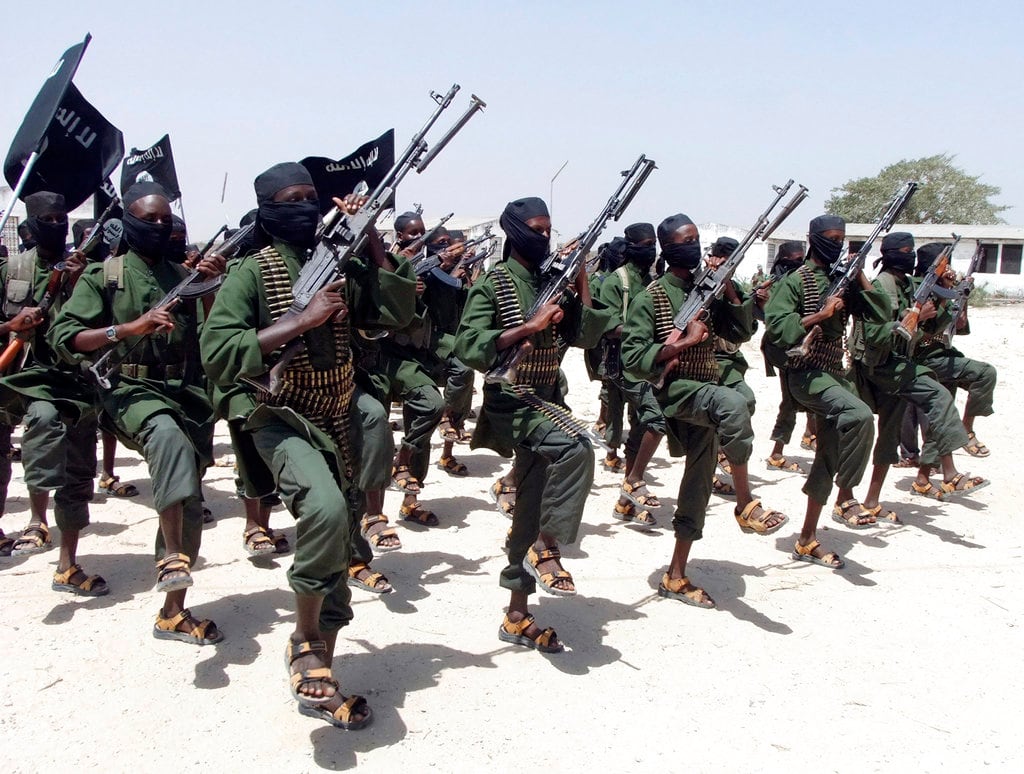NAIROBI, Kenya — A U.S. service member and two Department of Defense contractors died Sunday following an attack from al-Shabab militants in Manda Bay, Kenya, according to U.S. Africa Command. Two other Defense Department members were also injured in the attack, but remain in stable condition.
Kenyan authorities previously said that Somalia’s al-Shabab extremist group attacked a military base used by U.S. and Kenyan troops in coastal Kenya early Sunday. Kenya’s military said the pre-dawn assault was repulsed and at least four attackers were killed.
“Our thoughts and prayers are with the families and friends of our teammates who lost their lives today,” AFRICOM Commander U.S. Army General Stephen Townsend said in a news release. “As we honor their sacrifice, let’s also harden our resolve."
“Alongside our African and international partners, we will pursue those responsible for this attack and al-Shabaab who seeks to harm Americans and U.S. interests,” Townsend said. "We remain committed to preventing al-Shabaab from maintaining a safe haven to plan deadly attacks against the U.S. homeland, East African and international partners.”
The names of those who were killed in the attack have not been released yet.
AFRICOM said reports suggest that six contractor-operated civilian aircraft incurred damage from the attack, which AFRICOM spokesman Air Force Col. Christopher Karns said is not linked to tensions between the U.S. and Iran.
“Al-Shabaab very much has its own agenda and seeks to attack U.S., African, and Western interests,” he said.
It was the first known al-Shabab attack against U.S. forces inside Kenya, a key base for fighting one of the world’s most resilient extremist organizations.
A plume of black smoke rose above the base near the border with Somalia, where al-Shabab is based. Residents said a car bomb had exploded. Lamu county commissioner Irungu Macharia told The Associated Press that five suspects were arrested and were being interrogated.
AFRICOM confirmed the attack on Camp Simba in Lamu county. Karns called al-Shabab’s claims, including that its attack inflicted severe casualties, “grossly exaggerated."
There was no report Kenyan deaths.

AFRICOM, in a media release, said its forces, along with Kenya Defense Forces, repelled the attack and have cleared the airfield, which is “still in the process of being fully secured.”
The camp, established more than a decade ago, has under 100 U.S. personnel, according to Pentagon figures. A U.S. flag-raising there in August signaled its change “from tactical to enduring operations," the Air Force said at the time.
An internal Kenyan police report seen by the AP said two fixed-wing aircraft, a U.S. Cessna and a Kenyan one, were destroyed along with two U.S. helicopters and multiple U.S. vehicles at the Manda Bay military airstrip. The report said explosions were heard at around 5:30 a.m. from the direction of the airstrip. The scene, now secured, indicated that al-Shabab likely entered “to conduct targeted attacks," the report said.
According to another internal report seen by the AP, dated Friday, a villager that day said he had spotted 11 suspected al-Shabab members entering Lamu's Boni forest, which the extremists have used as a hideout. The report said Kenyan authorities did not find them.
RELATED

Al-Shabab's claim of responsibility said Sunday's attack destroyed U.S. equipment including aircraft and vehicles, and it posted photos of blazing aircraft it asserted were from the attack. A second al-Shabab claim issued hours later asserted that "ïntense close-quarters combat" against U.S. forces continued.
Kenya's military, however, said that “the airstrip is safe." It said that “arising from the unsuccessful breach a fire broke out affecting some of the fuel tanks located at the airstrip." The Kenya Civil Aviation Authority said the airstrip was closed for all operations.
Al-Shabab, which is linked to al-Qaida, has launched a number of attacks inside Kenya, including against civilian targets such as buses, schools and shopping malls. The group has been the target of a growing number of U.S. airstrikes inside Somalia during President Donald Trump’s administration.
The latest attack comes just over a week after an al-Shabab truck bomb in Somalia’s capital killed at least 79 people and U.S. airstrikes killed seven al-Shabab fighters in response.

Last year al-Shabab attacked a U.S. military base inside Somalia that is used to launch drone strikes. The extremist group also has carried out multiple attacks against Kenyan troops in the past in retaliation for Kenya sending troops to Somalia to fight it.
This attack marks a significant escalation of al-Shabab's campaign of attacks inside Kenya, said analyst Andrew Franklin, a former U.S. Marine and longtime Kenya resident.
“Launching a deliberate assault of this type against a well-defended permanent base occupied by (Kenya Defence Forces), contractors and U.S. military personnel required a great deal of planning, rehearsals, logistics and operational capability,” he said. Previous attacks against security forces have mainly been ambushes on Kenyan army or police patrols.
The early Sunday attack comes days after a U.S. airstrike killed Iran’s top military commander and Iran vowed retaliation, but al-Shabab is a Sunni Muslim group and there is no sign of links to Shiite Iran or proxies.
Analyst Rashid Abdi in Twitter posts discussing the attack said it had nothing to do with the tensions in the Middle East but added that Kenyan security services have long been worried that Iran was trying to cultivate ties with al-Shabab.
“Avowedly Wahhabist Al-Shabaab not natural ally of Shia Iran, hostile, even. But if Kenyan claims true, AS attack may have been well-timed to signal to Iran it is open for tactical alliances," he wrote, adding that “an AS that forges relations with Iran is nightmare scenario."
When asked whether the U.S. military was looking into any Iranian link to the attack, spokesman Karns said only that “al-Shabab, affiliated with al-Qaida, has their own agenda and have made clear their desire to attack U.S. interests."
The al-Shabab claim of responsibility said Sunday's attack was part of its “Jerusalem will never be Judaized" campaign, a rarely made reference that also was used after al-Shabab's deadly attack on a luxury mall complex in Kenya's capital, Nairobi, in January 2019.
___
Anna contributed from Johannesburg
Howard Altman is an award-winning editor and reporter who was previously the military reporter for the Tampa Bay Times and before that the Tampa Tribune, where he covered USCENTCOM, USSOCOM and SOF writ large among many other topics.




